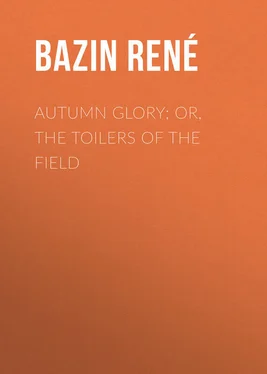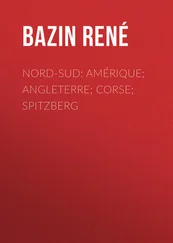René Bazin - Autumn Glory; Or, The Toilers of the Field
Здесь есть возможность читать онлайн «René Bazin - Autumn Glory; Or, The Toilers of the Field» — ознакомительный отрывок электронной книги совершенно бесплатно, а после прочтения отрывка купить полную версию. В некоторых случаях можно слушать аудио, скачать через торрент в формате fb2 и присутствует краткое содержание. Жанр: foreign_language, foreign_antique, foreign_prose, на английском языке. Описание произведения, (предисловие) а так же отзывы посетителей доступны на портале библиотеки ЛибКат.
- Название:Autumn Glory; Or, The Toilers of the Field
- Автор:
- Жанр:
- Год:неизвестен
- ISBN:нет данных
- Рейтинг книги:3 / 5. Голосов: 1
-
Избранное:Добавить в избранное
- Отзывы:
-
Ваша оценка:
- 60
- 1
- 2
- 3
- 4
- 5
Autumn Glory; Or, The Toilers of the Field: краткое содержание, описание и аннотация
Предлагаем к чтению аннотацию, описание, краткое содержание или предисловие (зависит от того, что написал сам автор книги «Autumn Glory; Or, The Toilers of the Field»). Если вы не нашли необходимую информацию о книге — напишите в комментариях, мы постараемся отыскать её.
Autumn Glory; Or, The Toilers of the Field — читать онлайн ознакомительный отрывок
Ниже представлен текст книги, разбитый по страницам. Система сохранения места последней прочитанной страницы, позволяет с удобством читать онлайн бесплатно книгу «Autumn Glory; Or, The Toilers of the Field», без необходимости каждый раз заново искать на чём Вы остановились. Поставьте закладку, и сможете в любой момент перейти на страницу, на которой закончили чтение.
Интервал:
Закладка:
When the two men had gone into the courtyard, she did not dare to follow them in, but leaning against a pillar of the ruined gateway, half hidden behind it, her head on her arm, she waited to see what would happen.
Her father and his man, crossing the yard, proceeded to Jean Nesmy's room, which was to the left beyond the stables. There was no sound but the noise of wooden shoes on the gravel; but Rousille had seen the cripple crouching down in the first rays of the sun, beyond the stables; he was nodding his head with an air of satisfaction, his malicious eyes never leaving the stranger he had denounced, who, yesterday so happy, was now the culprit.
Not far off, François, on a ladder, was cutting out a wedge of hay from a rick, firm and compact as a wall; he, too, was watching slyly from under the brim of his hat, but there was no malice upon his phlegmatic countenance, nothing more than a mild curiosity broadening his lips into a half smile under the heavy yellow moustache. He did his work as slowly as possible so as to be able to remain there and see the end of it.
Toussaint Lumineau and his man had soon reached the shed piled with empty casks, baskets, spades, and pickaxes, that had for many a year served as sleeping-place for the farm-servants. The master sat down on the foot of the bed. The look on his face had not changed; it was still the dignified paternal look of one who regrets parting from a good servant, and yet is resolutely determined to suffer no encroachment upon his authority, no disrespect to his position. Leaning his elbow upon an old cask showing marks of tallow, on which Jean Nesmy used to rest his candle at night, he slowly raised his head, and in the daylight that streamed in at the open door, he at length addressed the young man, who was standing bare-headed in the middle of the shed.
"I hired you for forty pistoles," he said. "You received your wages at Midsummer; how much is now owing to you?"
The lad, absorbed, began counting and recounting with his fingers on his blouse, the veins of his forehead swelling with the effort; his eyes were fixed on the ground, and not another thought disturbed the complicated operation of the countryman calculating the price of his labour. During this time, the farmer mentally went over the brief history of his connection with the lad, who, come by chance to the Marais in search of burnt cow-dung, used by the Vendéens for manure, had been then and there hired by him, and had quickly fallen into the ways of his new master. The farmer thought of the three years that the stranger lad had lived under the roof of La Fromentière, one before his military training, two since; years of hard, thorough work, of good conduct, without having once given cause for serious reproof, of astonishing gentleness and submission despite his sons' hostility, which, manifested on the very first day, had never lessened.
"It should make ninety-five francs," said Jean Nesmy.
"That is what I make it," said the farmer. "Here is the money. Count and see if it is right." From his coat pocket where he had already placed them, Toussaint Lumineau drew out a number of silver pieces which he threw on the top of the cask. "Take it, lad."
Without touching the money Jean Nesmy had drawn back.
"You will not have me any longer at La Fromentière?"
"No, my lad, you are going." The old man's voice faltered, and he continued: "I am not sending you away because you are idle, nor even, though it did annoy me, because you are too fond of shooting wild-fowl. You have served me well. But my daughter is my own, Jean Nesmy, and I have not given my consent to your courting her."
"If she likes me, and I like her, Maître Lumineau?"
"You are not one of us, my poor boy. That a Boquin should marry a girl like Rousille is an impossibility, as you know. You should have thought of it before."
For the first time Jean Nesmy's face grew a shade paler, he half closed his eyes, the corners of his mouth drooped as though he were about to burst into tears. In a low voice he said:
"I will wait for her as long as you think fit. She is young, and so am I. Only say how long it must be, and I will submit."
But the farmer answered:
"No, it cannot be. You must go."
The young man quivered from head to foot. He hesitated for a moment, with knitted brows, his eyes fixed on the ground, then decided not to speak his thought: I will not give her up. I will come back. She shall be mine. True to the taciturn race from which he sprang, he said nothing, took up the money, counted it, dropping the pieces one by one into his pocket as he did so. Then without another word, as though the farmer were not in existence, he began to collect his clothes and belongings. The blue blouse that he knotted by the sleeves to the barrel of his gun held them all, save a pair of boots that he slung on to a piece of string. When he had finished, he raised his hat, and went out.
It was broad sunshine. Jean Nesmy walked slowly; the strong will that dominated the slight youth made him hold his head high, and his eyes scanned the windows of the house seeking Rousille. She was nowhere to be seen. Then in the middle of the great courtyard, he, the hired servant, who had been dismissed, who had but another moment to tread the ground of La Fromentière, called:
"Rousille!"
A pointed coif appeared at the angle of the gateway; Rousille came forth from her shelter and ran to him, tears streaming down her face. But almost at the same moment she stopped, intimidated by the sight of her father on the threshold of the shed, and stricken with terror at a cry which, rising from that side of the courtyard, some fifty paces off, had caused Nesmy to turn his head:
" Dannion! "
A monstrous apparition came out from the stables. The cripple, bare-headed, with eyes bloodshot, inspired by impotent rage, had rushed out, with arms rigid on his crutches, his huge body shaking with the effort. Roaring like some wild beast with wide-open mouth he hurled the old cry of hatred at the stranger, the cry with which the children of the Marais greet the despised dwellers of the Bocage.
" Dannion! Dannion Sarraillon – look to yourself!"
Rushing with a speed that betokened the violence and strength of the man, he neared Nesmy. The rage in his heart, the jealousy that tortured him, the agony caused by the effort he was making, rendered the convulsed face terrible to behold, as it was projected forward by jerks; while onlookers could not but think, with a shudder, what a powerful man this deformed, unearthly looking creature had once been.
Seeing him come close up to the farm-servant, Rousille was terrified for the man she loved. She ran to Jean Nesmy, put her two hands on his arms, and drew him backward towards the road.
And, on her account, Jean Nesmy began to draw back, slowly, step by step, while the cripple, growing still more furious, shouted insultingly:
"Let go of my sister, Dannion !"
The farmer's loud voice interposed from the depths of the courtyard:
"Stop where you are, Mathurin; and you, Nesmy, loose your hold of my daughter!"
And he advanced to them, without haste, as a man not desiring to compromise his dignity. The cripple stopped short, let go of his crutches, and sank exhausted to the ground.
But Jean Nesmy continued to retreat. He had placed his hand in Rousille's; and soon they were within the portal of the gateway, framed in sunshine. There lay the road. The young man bent towards Rousille and kissed her cheek.
"Farewell, my Rousille," he said.
And she, running across the courtyard without looking back, her hands to her face, wept bitterly.
Having watched her disappear round the corner of the house by the barn, Nesmy called out:
"Mathurin Lumineau, I shall come back!"
Читать дальшеИнтервал:
Закладка:
Похожие книги на «Autumn Glory; Or, The Toilers of the Field»
Представляем Вашему вниманию похожие книги на «Autumn Glory; Or, The Toilers of the Field» списком для выбора. Мы отобрали схожую по названию и смыслу литературу в надежде предоставить читателям больше вариантов отыскать новые, интересные, ещё непрочитанные произведения.
Обсуждение, отзывы о книге «Autumn Glory; Or, The Toilers of the Field» и просто собственные мнения читателей. Оставьте ваши комментарии, напишите, что Вы думаете о произведении, его смысле или главных героях. Укажите что конкретно понравилось, а что нет, и почему Вы так считаете.












